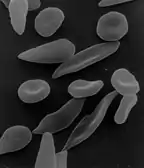sickle
English

Etymology
From Middle English sikel (also assibilated in sichel), from Old English sicol, siċel, from Proto-Germanic *sikilō (“ploughshare”), of uncertain origin. Possibly a borrowing from Latin sēcula (“sickle”) or sīcīlis (“sickle”); or, alternatively derived as a diminutive of Proto-Germanic *seką (“ploughshare”), from Proto-Indo-European *seg-, a variant of Proto-Indo-European *sek- (“to cut”). Cognate with West Frisian systel, sisel, sizel (“sickle”), Dutch sikkel (“sickle”), German Sichel (“sickle”). Related also to West Frisian sichte (“sickle”), Dutch zicht (“sickle”), German Low German Sichte, Sicht (“sickle”), German Sech (“the blade of a sickle or scythe”).
Pronunciation
- IPA(key): /ˈsɪkl̩/
Audio (US) (file) Audio (UK) (file) Audio (AU) (file) - Rhymes: -ɪkəl
- Hyphenation: sic‧kle
Noun
sickle (plural sickles)
Synonyms
Coordinate terms
Derived terms
Translations
|
|
Verb

sickle (third-person singular simple present sickles, present participle sickling, simple past and past participle sickled)
- (agriculture, transitive) To cut with a sickle.
- (transitive) To deform (as with a red blood cell) into an abnormal crescent shape.
- (intransitive) Of red blood cells: to assume an abnormal crescent shape.
Derived terms
- (transitive: to deform): sickler
Translations
Adjective
sickle (comparative more sickle, superlative most sickle)
- Shaped like the blade of a sickle; crescent-shaped.
- a sickle moon
Derived terms
Translations
|
|
- The translations below need to be checked and inserted above into the appropriate translation tables, removing any numbers. Numbers do not necessarily match those in definitions. See instructions at Wiktionary:Entry layout#Translations.